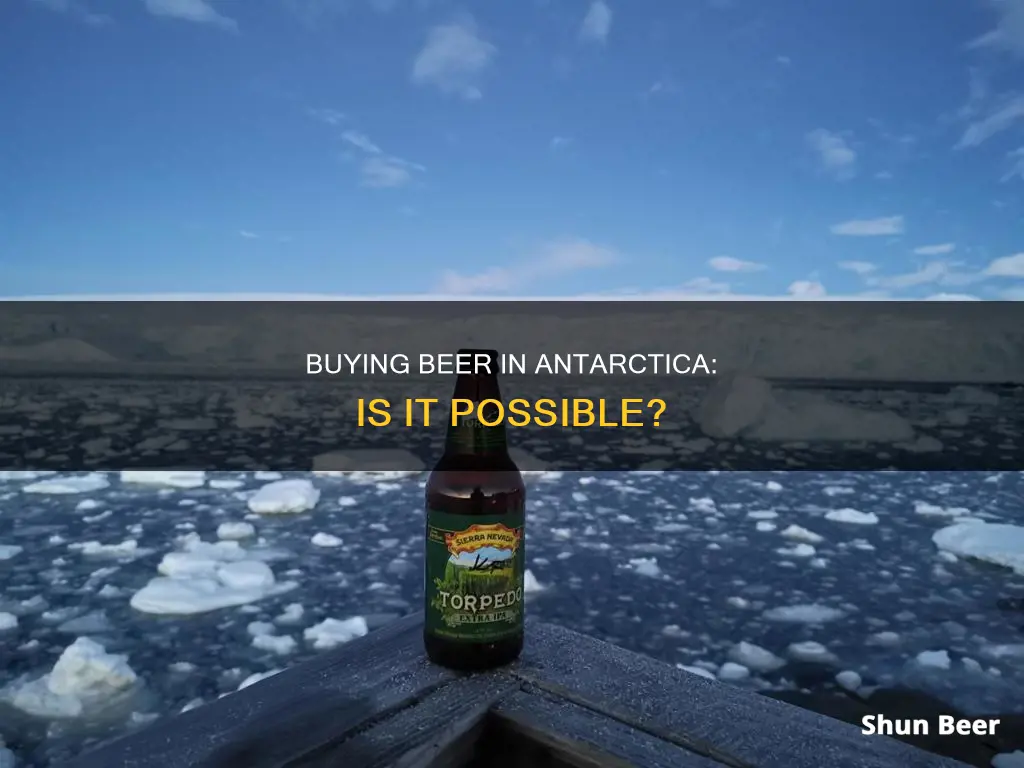
Antarctica is a continent of extremes—the highest, driest, windiest, emptiest, and coldest place on earth. It is also the only continent without a native human population. So, can you buy beer there? The short answer is yes. While there are no breweries within its borders, beer is shipped in from other countries. In the past, large or international brands were brought in, but now, craft beer is making the journey to Antarctica. The US Antarctic Program sources beer from Avery Brewing Co. and Oskar Blues, while the Ukrainian Vernadskiy Station is said to make its own hot pepper vodka. However, drinking in Antarctica has come under scrutiny due to reports of sexual assault and harassment, with the US's National Science Foundation reporting that 59% of female employees had experienced harassment or assault by colleagues. As a result, some Antarctic bases have banned the sale of alcoholic drinks, with residents only able to buy a permitted alcohol ration.
What You'll Learn

Beer must be imported to Antarctica
Antarctica is the coldest, windiest, and driest continent on Earth, and it has no native human population. The continent hosts less than 5,000 people during its summer season, and these are almost exclusively scientific researchers and their support staff.
As there are no breweries in Antarctica, all beer must be imported. The dozen or so countries that have research stations on the continent usually source beer from their home countries. In the past, large or international brands were shipped to Antarctica, but more recently, craft beer has been making the journey.
The US Antarctic Program's beverage and retail manager, Jason Kirk, is responsible for sourcing all food and drink for US researchers stationed in Antarctica. He has imported craft beer from breweries such as Avery Brewing Co., Oskar Blues, Samuel Adams, Sierra Nevada Brewing Co., and New Belgium Brewing Co. Kirk aims to focus on canned craft beers to reduce shipping weight and cut down on waste, as every item brought into the base must be returned due to the importance of environmental maintenance in this fragile ecosystem.
While drinking culture is prevalent in Antarctica, with bars and happy hours available at research stations, there have been concerns about alcohol-related misconduct and safety issues. In 2023, the National Science Foundation's McMurdo Station banned the sale of alcoholic drinks to resident scientists to address reports of sexual assault. Workers at the base are still permitted to buy a ration of 18 beers, three 75cl bottles of wine, or one 75cl bottle of spirits per week, and they can consume these drinks in the two main bars.
Hulk Hogan Beer: Where to Buy and Enjoy
You may want to see also

Drinking in Antarctica is illegal in certain places
Antarctica is the coldest, windiest, and driest continent on Earth. It is home to breathtaking beauty, penguins, and leopard seals. During its summer season, Antarctica hosts less than 5,000 people, the majority of whom are scientific researchers and their support staff. With no native human population, there are no breweries within its borders, so all beer must be imported.
While drinking in Antarctica is a part of the experience for many travellers, it is important to note that there are certain places where it is illegal to consume alcohol. For example, drinking on Antarctic land is prohibited, as you are only supposed to take water with you on your treks. However, some visitors have chosen to ignore this rule and have brought wine or beer to toast their trip.
In addition, due to concerns about sexual assault and harassment, the National Science Foundation's McMurdo Station has banned the sale of alcoholic drinks to resident scientists. The base, located on Ross Island, can accommodate up to 1,500 residents, with approximately 70% being male. According to a 2022 report, 59% of female employees reported experiencing harassment or assault by colleagues. While not everyone agrees that restricting alcohol sales will effectively address the issue, the foundation aims to curb alcohol-related problems and promote a safer environment for all residents.
It is worth noting that drinking during work hours or on the job is strictly prohibited, and it is illegal to distill or brew spirits on the base. However, outside of work hours, alcohol is permitted, and there are several options for drinking in Antarctica. These include the onboard bars and Happy Hour on ships, as well as bars at research stations like the Ukrainian Vernadskiy Station, which is known for its hot pepper vodka.
Non-Alcoholic Beer: Legal Age for Purchase and Consumption
You may want to see also

Alcohol is restricted at some Antarctic bases
Antarctica is the coldest, windiest, and emptiest continent on Earth, and there are no breweries within its borders. The dozen or so countries with research stations on the continent usually source their beer from home, giving their staff a taste of something familiar. The US is no exception. In the past, large or international brands have been shipped to Antarctica, but these days, craft beer is making the journey.
The National Science Foundation's (NSF) McMurdo Station, the US's scientific research facility in Antarctica, previously had three bars. However, in 2023, the sale of alcoholic drinks to resident scientists was banned in an effort to address reported instances of sexual assault. While the Coffee House at McMurdo Station became entirely alcohol-free, workers could still bring their own alcohol to the two main bars, Exposure and Gallagher's. They could also buy a permitted alcohol ration of 18 beers, three 75cl bottles of wine, or one 75cl bottle of spirits per week.
The Australian Antarctic Division also halved the alcohol allowance at its bases in 2021, citing concerns about drunken mistakes in a potentially fatal environment. The current allowance is about half of what is permitted at the US's McMurdo Station: seven cans of beer, one and a half bottles of wine, or half a bottle of spirits.
While drinking during work hours is prohibited, and it is illegal to distill or brew spirits on US bases, alcohol consumption is a part of social life for many scientists, technicians, cooks, and drivers at the main US bases. The isolation and harsh conditions of Antarctica can be depressing, and alcohol serves as a social lubricant to help people decompress.
However, drinking has also led to issues such as unpredictable behaviour, fights, indecent exposure, and employees arriving to work under the influence. There is a cultural split between scientists ("beakers") and contract workers, with scientists facing fewer consequences for breaking the rules.
Buying Beer Late Night in Kentucky: What's the Law?
You may want to see also

Drinking culture varies between scientists and contract workers
Antarctica is a continent of extremes—the highest, driest, windiest, emptiest, and coldest place on Earth. It is also a continent without a native human population. During its summer season, Antarctica is host to less than 5,000 people, the vast majority of whom are scientific researchers and their support staff.
Given the harsh environment and the months-long stays, it is perhaps unsurprising that many of those stationed in Antarctica turn to alcohol to decompress. However, the drinking culture varies between the scientists and the contract workers who keep the bases running.
The scientists, known as "beakers", and the contract workers tend to eat, drink, and socialise separately, much like officers and enlisted soldiers in the military. This cultural split is underscored by the fact that the two groups face different consequences for the same actions. As one commentator notes, "there is little consequence" for the actions of scientists in Antarctica. This was exemplified by the case of a researcher who was found to be brewing his own beer in one of the science labs, in violation of the rules. While this would likely have resulted in a contractor being fired, the scientist in question simply went home, keeping his job.
The divide is also evident in the living quarters. McMurdo, the largest settlement on the continent, has three bars, and the South Pole Station has a small BYOB lounge in one of its base's fire-proof survival pods. However, drinking on the job or during work hours is prohibited, and it is also illegal to distill or brew spirits on the base.
In an effort to curb alcohol-related problems, the National Science Foundation has considered deploying breathalysers at the bases. This proposal was partly in response to a report from the Associated Press regarding instances of female workers being sexually assaulted while working in Antarctica. The report found that 59% of female employees had been harassed or assaulted by colleagues, with alcohol often blurring the lines of consent.
While the sale of alcoholic drinks has been banned at some bases, workers are still able to buy alcohol and bring it to the bars. The permitted alcohol ration is 18 beers, three 75cl bottles of wine, or one 75cl bottle of spirits per week.
The drinking culture in Antarctica, therefore, reflects the unique challenges and pressures of life on the isolated continent, as well as the different roles and consequences faced by scientists and contract workers.
Narragansett Beer: Where to Buy and Enjoy It
You may want to see also

Drinking on the job or during work hours is prohibited
Drinking in Antarctica is a controversial topic. While it is not illegal to drink in Antarctica, there are some important regulations and guidelines that must be followed. Drinking on the job or during work hours is strictly prohibited. This includes working under the influence, which can lead to unpredictable behaviour, fights, and indecent exposure. The consequences for drinking on the job can be severe, and it is important to prioritize safety and responsibility, especially in such a remote and extreme environment.
The National Science Foundation (NSF) has implemented measures to reduce alcohol-related problems and promote responsible drinking. They have considered deploying breathalyzers to enforce teetotaling mandates and ensure personnel are fit to work. However, the distribution and administration of breathalyzers in Antarctica present legal and logistical challenges, as it is not US territory.
The sale and consumption of alcohol in Antarctic base bars have also been restricted. The National Science Foundation's McMurdo Station, the US scientific research facility in Antarctica, banned the sale of alcoholic drinks to resident scientists to address reports of sexual assault and harassment. While not everyone agrees that these measures will be effective, the NSF is committed to fostering a safe and respectful environment for all residents.
It is worth noting that drinking culture varies between different groups in Antarctica. For example, there is a cultural split between scientists ("beakers") and contract workers, who tend to socialize separately. Additionally, drinking habits can be influenced by the isolation and challenging conditions, with alcohol serving as a social lubricant to decompress.
Overall, while drinking is not prohibited in Antarctica, it is important to abide by the regulations and consume alcohol responsibly, particularly when considering the unique challenges and risks associated with working in this extreme environment.
Buying Beer Legally: Age Limit and Drinking Laws Explained
You may want to see also
Frequently asked questions
Yes, you can buy beer in Antarctica. There are bars in Antarctica, and you can also bring your own beer.
No, drinking your own beer on Antarctic land is illegal. You should only take water with you on your treks.
Yes, there are bars in Antarctica. There is a bar at the Ukrainian Vernadskiy Station, for example.
Yes, the largest US base in Antarctica, McMurdo, has three bars.
Yes, but only during your free time. Drinking on the job or during work hours is a big no-no.







